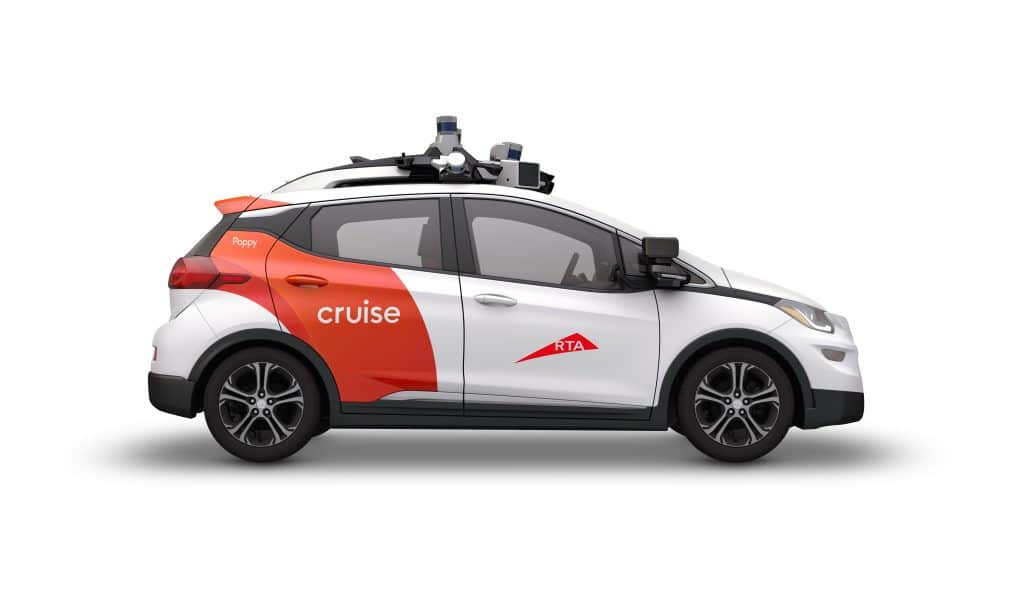The RTA in Dubai will showcase its all-electric self-driving cars at Gitex this week.
With the aim of making a quarter of all journeys undertaken in self-driving cars by 2030 it is a key step in Dubai’s ambition to become a global leader in autonomous transport.
Other smart initiatives to be unveiled by the RTA at Gitex are an entry into the metaverse, a new generation of taxis and smart stations.
Are self-driving cars the future?
The self-driving cars used by the RTA are Cruise vehicles are built on the Chevrolet Bolt platform. These autonomous self-driving cars are currently used in Cruise’s commercial fleet of self-driving cars in San Francisco.
Cruise opened its self-driving ridehail service to the public in February 2022, marking the first time a company has operated a commercial self-driving ridehail service in a major U.S. city. In September, Cruise announced plans to expand this service to Austin.
Through autonomous vehicles, RTA,GM and Cruise envision a safer and less congested future for all, enhancing the safety and accessibility to transportation on a large scale.
Such efforts will also advance General Motors’ vision of zero crashes, zero emissions, and zero congestion.
Mattar Al Tayer, Director-General, Chairman of the Board of Executive Directors of the Roads and Transport Authority, said: “RTA has outlined an integrated roadmap for the future of self-driving transport.
“It is moving ahead toward realising the Dubai Smart Self-Driving Transport Strategy aimed to transform 25% of total mobility journeys in Dubai into journeys on various self-driving transport means by 2030.
“It recently completed an initial phase of preparing digital maps of Jumeirah area for Cruise’s self-driving vehicles.
“This is in preparation for the launch of the actual service by 2023 rendering Dubai the first city in the world to commercially operate Cruise self-driving vehicles outside the US Cruise’s next-generation self-driving vehicle, the Origin will be deployed in limited numbers next year to offer taxi and e-hail services.
“We have plans to increase the number of deployed vehicles gradually to reach 4000 by 2030.” added Al Tayer.
2030 vision for self-driving cars
Last month Arabian Business reported how Dubai’s Roads and Transport Authority (RTA) is embracing artificial intelligence and robotic process automation to improve its operational efficiency.
Speaking on the RTA’s digital ambitions Mattar Al Tayer said: “RTA has undergone a comprehensive digital transformation and embraced emerging technologies and artificial intelligence as means of boosting productivity and raising operational efficiency.
“It has also launched new services to improve the wellbeing of Dubai’s residents and visitors alike.
“Undertaking such plans responds to the directives of His Highness Sheikh Mohammed bin Rashid Al Maktoum, Vice-President and Prime Minister of the UAE, and Ruler of Dubai, to improve the quality of life in Dubai and provide multiple mobility options for residents to make Dubai the best city for living in the world.
“It is also a manifestation of the instructions of His Highness Sheikh Hamdan bin Mohammed bin Rashid Al Maktoum, Crown Prince of Dubai and Chairman of the Executive Council, to enhance Dubai’s competitiveness as a world-leading digital capital and reinforce its profile as a role model in designing government operations and services that enhance customer happiness,” he commented.
RTA in the metaverse
The RTA will use Gitex as the platform to showcase its move into the metaverse.
With the use of augmented reality technology, RTA will also showcase the latest technology in the metaverse field, using digital twins to demonstrate Dubai Metro’s rail network.
The digital twin platform combines historical maintenance data from the past 12 years of Dubai Metro service with real-time data collected by external data-collection devices to reveal minute details and other critical situations that affect asset lifecycles.
Using historical and real-time data, the platform offers recommendations for improving the asset life cycle, such as changing periodic maintenance schedules and other approved procedures, as well as machine learning and system development to predict possible failures in the future.
Dubai Taxi Corporation is due to show off its new generation of taxi operation systems.
The system uses artificial intelligence technologies to streamline taxi shifts by scheduling taxi allocation to drivers on a demand basis.
The driver can move directly to the site for receiving the vehicle using smart keys to operate the vehicle. Through cameras fitted on taxis, the system can verify the identity of the driver.
The Dubai Taxi Corporation will also showcase the new generation of taxis fitted with interactive hi-tech screens enabling riders to watch news, games, and more.

They also have a new metre that can be operated through the app, which enables the opening and locking of the vehicle, as well as the Alipay service, and a rear advertising screen.









